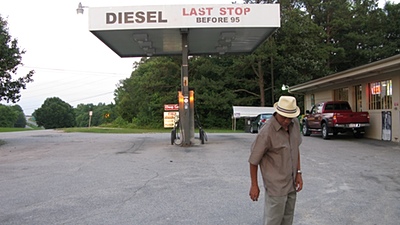The Road to Las Vegas
Insight-free documentary looking at turbulent times in a family.

This documentary focuses on the journey of an American family relocating from Alaska to Las Vegas in search of a better life. The Meltons are by no means a nuclear family, what with the father, Maurice, having a recurring crack cocaine problem. The mother, Vanessa, probably has as many issues given that she keeps taking him back despite him having either wrecked or sold some ridiculous number of cars either while high or to get high. I'm sure it was something like sixteen cars, which is an achievement of sorts, I suppose.
The five years of the family life covered are far from smooth, which while tragic for those involved at least make for reasonably interesting viewing. I was going to say entertainment, but that seems to trivialise the lives of those involved. You know that things aren't going to be plain sailing from the outset, when Vanessa declares that God told her to move in a dream, which for most people would suggest a course of medication rather than a road trip. Less charitable people than I would suggest that leaving with two hundred odd dollars and having your family, including four kids, live and sleep in a rented car for months would not seem to be particularly responsible. Man, God's an asshole.
Recounting further the events of this would serve little purpose, so I shall leave it at that. While the film is perfectly reasonable, it's by no means the most probing of documentaries. While it recounts well enough the events, I don't feel as though I have any particular insights into any of these characters. We don't explore why Maurice keeps going back to the drugs, or why Vanessa is keeps taking him back. They seem nice enough people, especially their kids, but that's not really enough reason to put them on a cinema screen.

If I were to go out on a limb, I'd assume that the subtitle of "a story of boom and bust" is supposed to relate this back to American society as a whole, but if that's accurate then director Jason Massot's reach has exceeded his grasp. Sure, it's not a bad film, and there's some very pretty shots of the landscape taken along the way, but this is little recompense for having little in the way of relevance to the issues that it seeks to explore.
If you find yourself at some point in the future watching this film, then I don't doubt for a second that it will do nothing to offend your sensibilities and you will pass the time well enough. However it's really not saying anything that would allow me to recommend you making any effort to put yourself in that position in the first place.
Maurice Melton (Himself)